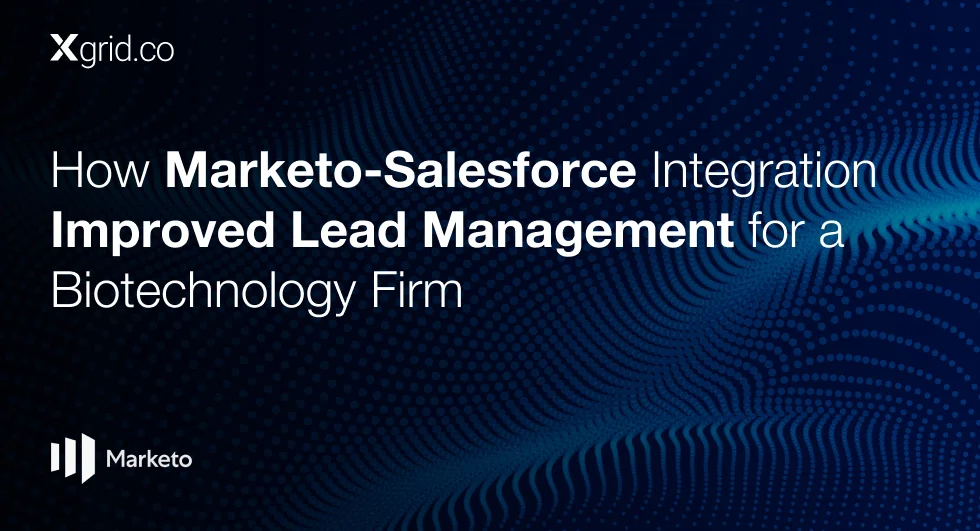Expert Insights for choosing the right Marketing Automation Platform
To get a closer look at the successes and challenges faced by businesses in the marketing automation landscape, we recently had the privilege of speaking with Amy Abascal, a seasoned marketing leader who has worked directly with industry giants like Marketo, Eloqua, and HubSpot.
Drawing from her vast experience, Amy provided firsthand insights into the evolution of these platforms, the importance of lead scoring, and the future of marketing automation.
This article synthesizes Amy’s experiences and insights into actionable takeaways for decision-makers who are navigating the selection and implementation of marketing automation tools.
1. The Power and Simplicity of Marketo: Still a Leader in Marketing Automation
One of the most consistent takeaways from Amy’s experience is Marketo’s enduring value as a powerful yet user-friendly marketing automation tool.
As she recalls, “Marketo was easier to use, and you could hand it off to a junior marketer.” This simplicity is one of Marketo’s key strengths, especially for mid-market companies looking to implement automation without a highly technical team.
Marketo’s strong point, however, goes beyond its simplicity. Its lead scoring capabilities have made it the tool of choice for businesses looking to optimize lead management.
Amy emphasized how lead scoring has become an integral part of any serious marketing operation: “I find Marketo is far better suited to doing lead scoring properly.” For businesses that rely heavily on scoring leads based on behavior, demographics, and engagement, Marketo’s flexibility and depth in this area remain unmatched.
1.1 Best Practice
Actionable Tip: If your business is growing and you are expanding your marketing team, Marketo should be your go-to tool for automating lead scoring and email marketing campaigns. Its ease of use means that you won’t need a dedicated technical team to get the best out of it.
2. Eloqua’s Power and Pitfalls: When Complexity Becomes a Barrier
While Eloqua once stood as one of the top contenders in marketing automation, Amy’s experiences with the platform highlight the complexities that have limited its appeal, particularly to non-enterprise businesses. “Eloqua was incredibly powerful, but the amount of steps to do things made it complicated,” Amy noted.
For businesses with robust technical teams, Eloqua may still provide the deep customization and power they need. However, for mid-market companies without the technical expertise to manage its complexity, Eloqua’s intricate processes present a significant barrier. “You couldn’t take this tool and go to a junior marketer and say, ‘Go run an email campaign.’ It was far too complicated for that,” Amy explained. After Oracle’s acquisition of Eloqua, these complexities only grew, making it a less popular choice among businesses looking for more intuitive solutions.
2.1 Best Practice
Actionable Tip: For large enterprises with dedicated marketing operations teams, Eloqua’s deep functionality may still be worth the investment. However, smaller businesses or those with less technical expertise should consider other platforms that offer similar power without the complexity.
3. HubSpot: Closing the Gap with Marketo for Simplicity-Focused Businesses
HubSpot, once considered a less powerful alternative to Marketo, has made significant strides in closing the gap, especially for businesses looking for simplicity in their marketing automation tools. Amy acknowledged HubSpot’s recent advancements: “HubSpot has come a long way,” she said, though she still views Marketo’s lead scoring as superior.
The primary appeal of HubSpot lies in its ease of use, particularly for small to mid-sized businesses that don’t have the resources to manage a more complex system like Eloqua or Marketo. HubSpot’s intuitive interface and ability to integrate with Salesforce make it a compelling option for businesses with limited technical resources but significant marketing needs.
However, Amy maintains that for businesses looking to implement more sophisticated lead scoring and lifecycle processes, Marketo remains the stronger option.
3.1 Best Practice
Actionable Tip: If your business is in the SMB or mid-market range and you’re looking for an easy-to-use marketing automation tool, HubSpot offers a highly accessible option that can grow with your business. For more advanced needs, consider HubSpot in conjunction with Salesforce to maximize its effectiveness.
Downloads
Article (PDF-276 KB)MOST POPULAR INSIGHTS
- How Marketo Strengthened Data Hygiene and Marketing Efficiency for a Global Telecom Company
- How Marketo-Salesforce Integration Improved Lead Management for a Biotechnology Firm
- How a Tech Company Used Marketo to Refine ABM Strategies for Sales Engagement
- How Marketo Campaigns Were Streamlined with Templates and Tokens
- How Marketo Solidified Marketing Insights with Custom Attribution Models
4. Adobe’s Acquisition of Marketo: A Mixed Bag for Users
One of the more complicated dynamics in the marketing automation space has been Adobe’s acquisition of Marketo. While the acquisition brought new resources to the platform, Amy pointed out that it hasn’t been without its challenges. “Adobe has made some weird choices,” she said, referring to product integration challenges and the lack of development in tools like Bizible.
Bizible, designed for revenue attribution, was supposed to be a significant value add, but Adobe’s failure to fully support and develop the tool has left many users frustrated. “Adobe has kind of stopped supporting it,” Amy noted, explaining how these missed opportunities have impacted the platform’s overall performance.
4.1 Best Practice
Actionable Tip: For current Marketo users, continue to leverage its core strengths—lead scoring and marketing automation—while remaining cautious about Adobe’s broader product strategy. If tools like Bizible are critical to your operation, consider supplementing with third-party solutions to fill in the gaps.
5. Key Takeaways for Marketing Automation Success
From Amy’s extensive experience, several key takeaways emerge that can guide businesses in their marketing automation journeys:
- Lead Scoring is Non-Negotiable: Whether you’re using Marketo, HubSpot, or another platform, setting up an effective lead scoring system is essential for driving more qualified leads through your sales pipeline.
- Match Your Tool to Your Team: Choose a platform that aligns with the technical expertise of your team. For businesses with smaller or less experienced teams, HubSpot’s ease of use might be the right fit, while Marketo offers more depth for growing companies.
- Don’t Ignore Product Development: Stay aware of product roadmaps and ongoing support from platform providers. Adobe’s acquisition of Marketo shows that corporate strategies can impact the tools you use, so always evaluate whether the platform is keeping up with your needs.
- Balance Power with Simplicity: While tools like Eloqua offer immense power, their complexity may outweigh their benefits for companies without dedicated technical resources. Always assess the trade-offs between functionality and usability.
5.1 Implementing the Right Strategy: A Balanced Approach to Marketing Automation
Incorporating marketing automation into your business is not a one-size-fits-all process. The key is to strike the right balance between power, functionality, and usability based on your company’s specific needs.
As Amy’s experience shows, Marketo stands out for companies looking to grow and scale their marketing efforts, while HubSpot remains a viable option for businesses prioritizing ease of use. Eloqua, though powerful, may be best suited for large enterprises with technical resources.
Ultimately, the success of any marketing automation strategy will come down to choosing the right platform for your team, setting up effective lead scoring, and ensuring that your chosen tool continues to meet your needs as your business evolves.
Actionable Takeaway: Evaluate your current marketing operations team’s technical capabilities, the complexity of your marketing efforts, and the specific outcomes you aim to achieve. Select a marketing automation tool that aligns with these needs, and set up a clear roadmap to leverage its full potential over time.
Related Articles
Related Articles

Established in 2012, Xgrid has a history of delivering a wide range of intelligent and secure cloud infrastructure, user interface and user experience solutions. Our strength lies in our team and its ability to deliver end-to-end solutions using cutting edge technologies.
OFFICE ADDRESS
US Address:
Plug and Play Tech Center, 440 N Wolfe Rd, Sunnyvale, CA 94085
Dubai Address:
Dubai Silicon Oasis, DDP, Building A1, Dubai, United Arab Emirates
Pakistan Address:
Xgrid Solutions (Private) Limited, Bldg 96, GCC-11, Civic Center, Gulberg Greens, Islamabad
Xgrid Solutions (Pvt) Ltd, Daftarkhwan (One), Building #254/1, Sector G, Phase 5, DHA, Lahore




